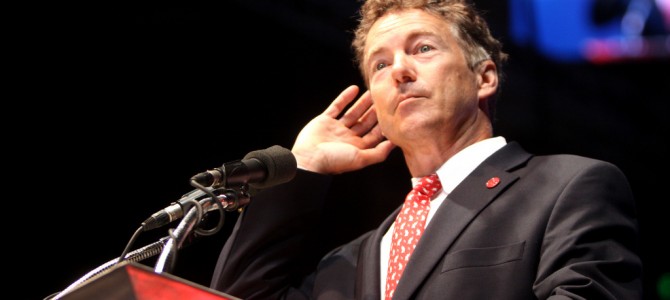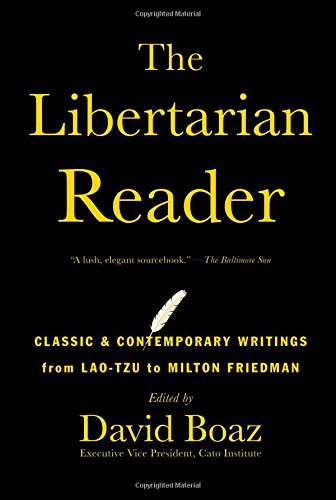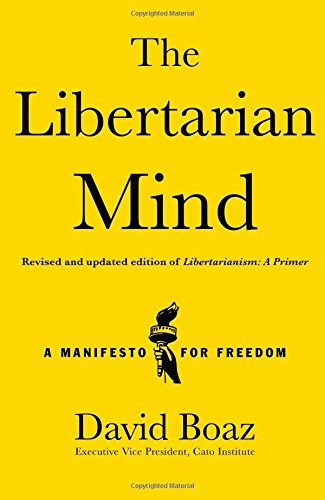
With issues like decriminalization and gay marriage gaining political traction, many pundits have argued that America is in the midst of a ‘libertarian moment.’ For those interested in contemporary arguments for libertarianism, David Boaz’s revised and updated The Libertarian Mind: A Manifesto for Freedom is good place to start. Boaz, executive vice president at the Cato Institute, contends that though the fundamentals of the philosophy have not changed since he first published the book in 1997, events – the rise Internet, 9/11, the Iraq war and the financial crash and its aftermath, among many others – have improved the prospects of libertarianism in America.
The Federalist spoke with Boaz about Rand Paul’s prospects, the social conservative-libertarian alliance, and the future of libertarianism in mainstream American politics.
The Federalist: There’s been a lot of talk about a ‘libertarian moment.’ One chapter in your book is titled, “The Coming Libertarian Age.” But if voters only incidentally agree with libertarians – let’s say they’re pro-pot legalization because they want to smoke pot, not because they care about individual freedom – does it really constitute a moment? Does it matter how voters reach their positions? And if they aren’t driven by philosophical reasons, can libertarianism really be a sustainable political movement?
David Boaz: It is a ‘libertarian moment’ if libertarian things happen, even though people have not embraced the philosophy of libertarianism. So if we legalize marijuana or if we cut the marginal tax rate, even if it was done by people who are self-interested and want to smoke pot or want more money in order to do it, it would still be a libertarian moment if libertarian things were happening.
So I do think that there is some evidence there are more libertarians today – which doesn’t necessarily prove the country is more libertarian. But I do think the campaigns of Ron Paul, and maybe Rand Paul, have recruited a lot of people to the idea that the federal government is too big, and that the Federal Reserve is not to be trusted, and that American intervention is dangerous. If you hold a combination of those views, I think that you can be counted as libertarian.
But there is more evidence. One of things I note in the book, is that eight years ago there was no national libertarian student organization. People used to say: How could you claim you have a political movement when you had no national student organization? Well, now there are two: Students for Liberty and Young Americans for Liberty, so that strikes me as evidence of a growing number of people wanting to be part of a libertarian movement and not just wanted to legalize drugs or cut taxes.
The Federalist: There has always been more common ground between libertarians and conservatives than libertarians and liberals. But there are always going to be areas of policy that are going to be difficult, if not impossible, to bridge. Do you believe there’s a place for social conservatives in the libertarian movement?
David Boaz: I don’t know if there is any one more socially conservative in his life than Barack Obama. I mean he’s married to the same woman. He has two children. Seems to be a good husband and father. So just being socially conservative in your life doesn’t say much about your political views. And, yes, it’s always been the case, at least post-war America, that there are more interaction between libertarians and conservatives than between libertarians and the Left. Students for Liberty tell me they have a lot of member who come from the Left. Obviously, they are very young, so how far on the Left could they really have been? But Young Americans for Liberty members clearly come mostly from the Right; they come from the Ron Paul campaign. We are seeing some liberal-libertarian cooperation in areas like NSA issues, but it is the case that there will be more cooperation among libertarians and conservatives.
The Federalist: Yes, but among many social conservatives with libertarian inclinations there is perception that most libertarians are invested in advocating for certain policy positions – say, gay marriage – but have almost no interest in issues like religious liberty. The recent RFRA case in Indiana comes to mind.
David Boaz: In what area have area have libertarians not defended religious liberty? It seems to me that mainstream libertarians have been generally supportive of gay marriage and the right of private individuals not to be required to participate in ceremonies that offend them. Cato has filed amicus briefs in gay marriage cases, also filed an amicus brief in the Elaine photography case out in New Mexico, and also in the Hobby Lobby case. I don’t know if there’s been a case in Indiana that would be relevant. People at Cato have defended the right of private individuals – and even reasonable large businesses like Hobby Lobby –to not support policies or participate in ceremonies that are offensive to them. It seems to me that libertarians have defended liberty on both sides on those particular issues.
The Federalist: And in some ways freedom of association is a far more difficult concept to sell voters than policy they are favorably inclined towards, like lower taxes or gay marriage. Rand Paul was tripped up a few years back trying to deal with some theoretical questions about the Civil Rights Act. How difficult will it be to make the case for things like freedom of association and exemptions for religious beliefs in contemporary politics?
David Boaz: In theoretical sense, of course the libertarian view is that no person should be required to enter into a contract with any other person. So if you don’t want to work at the Cato Institute you don’t have to, and if a restaurant doesn’t want to serve you they shouldn’t have to. However, we do live in a world shaped by history. There was an argument among libertarians when Rand Paul stumbled on this issue back in 2010. I think since 2010, Rand Paul has affirmed he supports the Civil Rights Act of 1964, period. But libertarians argued back in 2010; should we stand on the absolute libertarian principle of individual rights or should we acknowledge the reality that we have gone through 350 years of state oppression of African Americans and that you can’t simply say after the end of those 350 years of oppression, “ok we’re not going to do that anymore starting tomorrow,” and all of a sudden everyone is in a world of individual freedom.
Some libertarians defended the position that we would all be better off if all individual rights were firmly protected. Others said you have to make an exception when there has been this kind of history. There is a reasonable case to be made on both sides. But clearly, in modern America, nobody is questioning the discrimination provisions of the 1964 Civil Rights Act as they relate to race and other things that were in that act. Those are not live political issues.
The Federalist: But wouldn’t this be the case on numerous fronts? Libertarian ideas can’t just be implemented; we can’t just deregulate after a long history of regulation. We can’t just get rid of the tax code. So, as a political matter, how do libertarians make these arguments incrementally? Is Rand Paul the person to do it?
David Boaz: All Americans would be better off – with the exception of politicians, I guess – if we pursued radically libertarian policies. We would have stronger economic growth. We would have more social harmony. We would have a police forces constrained to protecting people. And in all of those areas, libertarian policies would improve the standard of living and the American experience. But we are not going to get all of those things. Rand Paul hasn’t said he supports everything I support in terms of deregulation and less government. And even if I were elected president, America wouldn’t get all those things immediately. I think it’s fair when we talk about the word ‘libertarian’ in a political context –whether we’re talking about Gary Johnson or Rand Paul or some possible other candidate – it is reasonable to judge the platform by looking at what the candidate is talking about now – on criminal justice reform, tax reduction, deregulation –without having to judge whether you would be comfortable in a world without any taxation. So I think you can make a philosophical argument for the full libertarian vision. And I think I can make that in my book. But the people running for office are not making that argument any more than Bernie Sanders is making an argument for full-fledged socialism.
The Federalist: So as a libertarian, what’s more important: process or results? For instance, if Barack Obama institutes executive measures on immigration that align with long-term libertarian goals, something that in your opinion moves us in the right direction, is it worth supporting even if it’s achieved through executive edict?
David Boaz: I think you would find that the people at Cato would not be entirely of one mind on the matter with the immigration stuff. There are other areas where Obama is clearly abusing the Constitution and the legal process. And I would point to Obamacare as one example. We’ve criticized him for suspending elements of Obamacare that we think are bad policies. But look, he wasn’t just granted a blank check to decide which laws are laws and which aren’t. If you think Obamacare doesn’t work make changes, if you’re not prepared to do that, just obey the law.
Immigration is a little different because one of the things involved is that he is saying, as I understand it, that he is not going to fully exercise the statutory authority to deport people – who, by the way, no one believes anyone will deport anyway; 12 million people, we’re not going to deport 12 million people. So he is suspending deportations in certain areas. I would say that on that issue, the people on the Cato Institute charged with defending the Constitution are quite critical, while noting that they support more liberal immigration rules. And the people who specialize in immigration have noted the benefit of more liberal immigration laws, while deploring that this has been done by fiat rather than by statute. There is a difference in emphasis.
The Constitution is important. Statutory law is less important than the Constitution, obviously, but still government should obey the law. You get into question then of what is the obligation of the executive? Making laws without authorization is clearly beyond the powers of the executive. Choosing when to enforce particular law – when there is always an enforcement issue; no law enforcement body has enough manpower to enforce every law – and so when it is appropriate or inappropriate to enforce a particular law. I think we can clearly see tht on local level. For example, laws against robbery and murder should always be enforced. The law against betting on football games, I think, is different. So it’s OK that the governor of Virginia did not prosecute me for entering a NCAA bracket competition back in march. Even though it’s probably illegal in Virginia.
The Federalist: It’s probably a safe bet to assume that it’s illegal. The proliferation of laws is another major problem many on the Left don’t seem to understand plays a large role in police abuse. In the case of Eric Garner in Staten Island, for instance …
David Boaz: Exactly. The more laws you have the more incidents of law breaking you have, and therefore there are more opportunities for police to have confrontations with citizens. People who want more laws banning the sale of loose cigarettes, or banning marijuana, or banning gambling or banning big sodas should think about the fact that while most people will just obey the laws, some will not, and that will increase the number of potential confrontations between police and citizens. It’s something that should be weighed in the decision on whether to pass these laws.
Now, as a libertarian, I say the government has no business telling me how big soda I can buy or sell. But as a non-libertarian, I ought still to think about this: do I really want the New York police department going around confronting bodega owners because the owner sold a 20-ounce soda to someone?
The Federalist: Let’s turn to libertarian foreign policy, which seems to be a major turn off for many people favorably disposed to domestic libertarian ideas. For a while there, conservatives seem to veer back towards a more traditional, less interventionist position. But lately, probably due to world events, Republicans are basically as hawkish as they were in 2000s. Is the coming debate going to do anything to change that?
David Boaz: Well, I’m not sure the candidates represent the voters as fully as they might imagine. There was a poll last June that found that 64 percent of Republicans thought that the Iraq had not been worth the costs. I have not seen a poll since then on that particular question. When Americans see other Americans beheaded on video they get pretty ticked off and they want to respond. So I’m not surprised that over the past few months there have been more hawkish attitudes among Americans generally, and that obviously includes conservatives and Republicans. Is still think that in nine months from now when people start going to the polls, you’re going to see something of a shift back to we’re-tired-of-15-years-of-war attitude. I don’t know that by that point Rand Paul’s slightly less non-interventionist position will be out of the mainstream of Republican voters, even though it will remain outside the mainstream of Republican officials.
The Federalist: Paul is the only Republican candidate who’s going to be offering anything resembling a libertarian argument on foreign policy. As you say, it’s going to be outside of mainstream GOP establishment norms. So how do you see his chances?
David Boaz: Ever since 1976 Republicans have always nominated the guy who ran second the last time. But since everyone is pretty sure the GOP is not going to nominate Rick Santorum, that means there is no guide to this year’s election. So it seems that it’s a more wide open field than we’ve ever seen. And in that context, I think Rand Paul has a chance. Would I bet on him against the field? No. I wouldn’t bet on anybody, including Jeb Bush, against the rest of the field. So I think Rand Paul has a chance. Some of it depends on whether I’m right about a lot of Republicans will be back to being war-weary by February of 2016. A lot depends on his personal abilities as a candidate. And a lot will depends on the nature of the economy and what the other candidates do and so on.
But I am looking forward debates and seeing some actual disagreements there. He has moved a little to the Republicans center on foreign policy issues already, but he still does say we need to be more skeptical about foreign intervention, that we need to be skeptical about the president being able to launch wars, including bombing campaigns without authorization from congress. And we need to be careful about unending blank checks and authorizations for war. If he can talk about those issues and make them distinct from what the other candidates say, it will help him. I would sort of like to be the only candidate in Iowa who agrees with 64 percent of Republicans voters about the Iraq war.
The Federalist: Do you see any other candidates running that have any worthwhile libertarian leanings?
David Boaz: You know, virtually every candidate in America has some libertarian instinct. Chris Christie and Scott Walker cut some state government pension. That’s a good thing. Rick Perry is a strong defender of the Second Amendment. John Kasich was always a budget cutter when he was here in Washington – I’m not quite sure how he’s doing at that in Ohio. Ted Cruz clearly has some libertarian sentiments.
The Federalist: Marco Rubio? Mike Lee who’s pretty libertarian is helping him on tax policy.
David Boaz: The Rubio-Lee tax plan is quite bad. So Rubio, I’m not sure. He took one decent position on immigration and then backed away.
I don’t see any other Republican out there with the libertarian appeal of Rand Paul; with positions that cut across left-right lines. Rand Paul is talking a lot about free enterprise, about low taxes, low spending, but he is also in favor a more restrained foreign policy and a more restrained government in regard to civil liberties. Still, virtually every candidate has some libertarian position. Even on the Democrat side; they are for gay marriage and maybe trimming NSA surveillance. Though, I’m not clear Hillary Clinton is for criminal justice reform or trimming NSA surveillance or anything else that’s libertarian.










